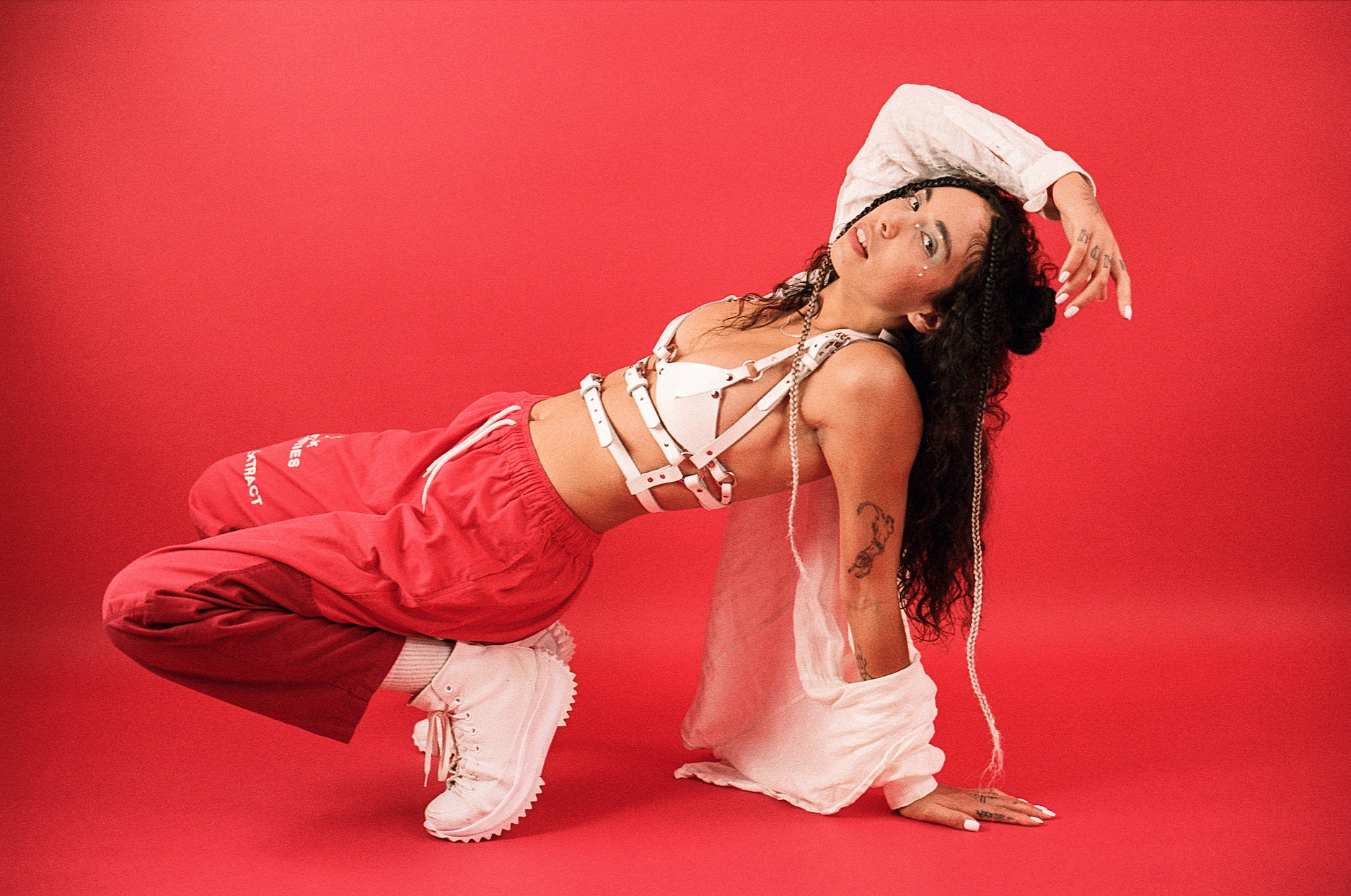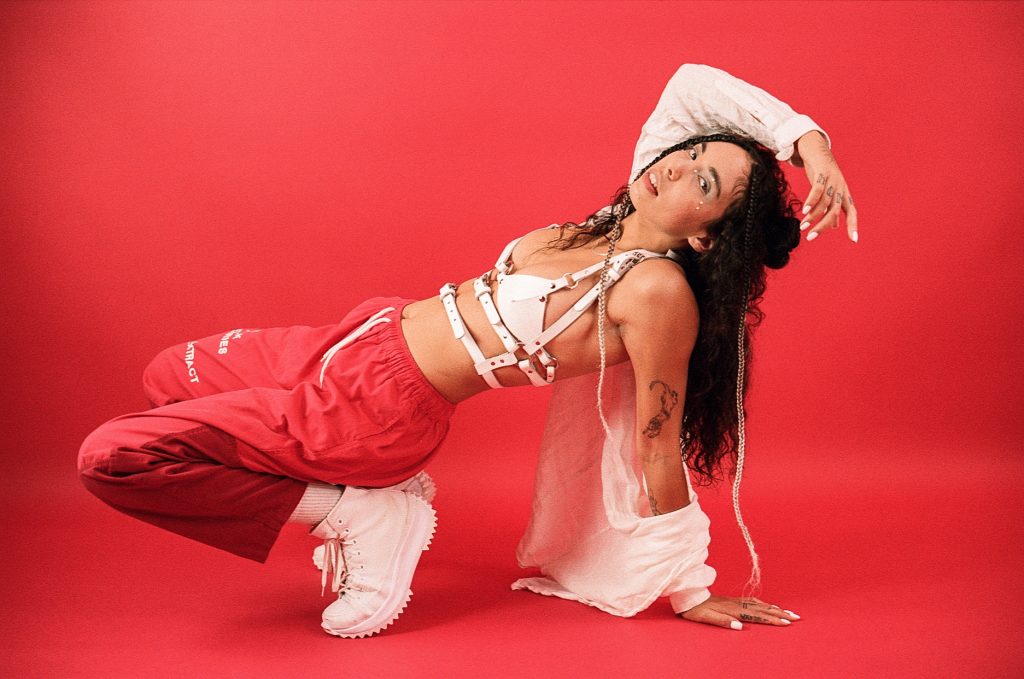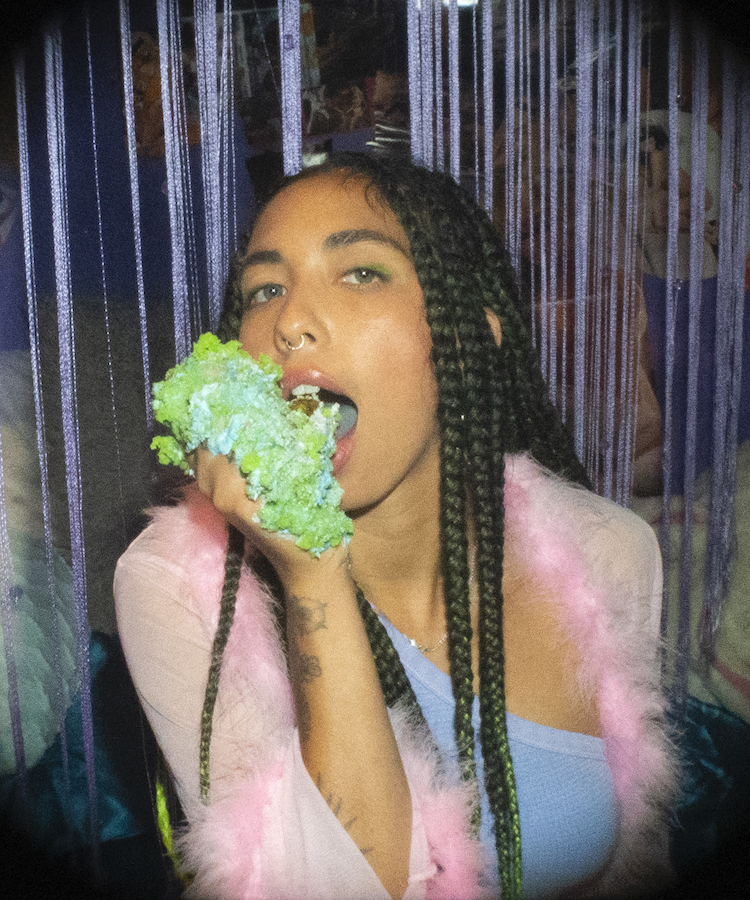
“I’d rather die before you die/ Before you die, before you die,” Indigo De Souza repeats hazily on her confessional song, “Die Cry.” The line is emblematic of the indie singer-songwriter’s work, which is full of obvious, dark truths. For De Souza, these frank moments of introspection and fearlessness are the backbone of her second album Any Shape You Take on August 27. Her goal? To make people unabashedly feel their feelings.
“I think that we live in a society where we’re not allowed to take the time to feel things fully because it moves so fast and survival is so key,” De Souza says over the phone while walking near her home in the Asheville area. “People get much more caught up in survival than they do embodying the things they’re feeling.”
Raised by a Brazilian Bossa Nova guitarist father and an artist mother, a shy De Souza was encouraged to pour her emotions into art from an early age. “I know that [my dad] played guitar for me a lot when I was a baby because I’ve seen videos of it,” she recalls. While they divorced when she was around three years old, music is what De Souza felt provided a connection to her father. “He’s very similar to me in the way that music is the most sensible thing to him and other stuff has been hard for him to acclimate to in the world,” explains the singer. “So, I think that has always been nice for me to know that someone I’m related to feels the same way.”
Growing up, she spent her time listening to a pastiche of Jack Johnson, Regina Spektor, Elliott Smith and Frank Sinatra. At 9, she started playing guitar, and by 11, she was penning her own songs and performing them. By 16, she relocated to Asheville and found herself connecting with a broader artistic community. It was there she met a cohort of artists like Brad Cook, who produced De Souza’s latest record. But first, the newcomer self-released her debut I Love My Mom prior to touring with artists like Alex G and Beach Bunny.
What followed is the release of Any Shape You Take, where the 24-year-old singer-songwriter reveals pours grief, pain and heartbreak into the 10-track record brimming with garage pop, grunge and bright TikTok pop. But De Souza’s self-awareness throughout the 10-track album and defiance from genre conformity makes Any Shape You Take a masterful body of work that echoes the joy of endless summer nights and the primal feelings that stem from deep introspection. With Any Shape You Take, De Souza’s astute self-awareness primes her for longevity.
A few days before De Souza released her latest album, she spoke with SPIN about her artistic background, how pain fueled her latest record and her experience with Saddle Creek.
SPIN: How did you get into making music, and how did your upbringing kind of lend yourself to that?
Indigo De Souza: I’ve always wanted to do that ever since I knew that it was something you could do. My mom has always been a visual artist. She was an art teacher for 20 years, and she is also an artist in many other ways — is a chef, cuts hair, can build anything. And then my dad is a Bossa Nova guitarist. So, I think my family was always really artistic, and I saw the importance of art from an early age. Nothing else really made sense my whole life.
What was your experience like signing to Saddle Creek?
It was really a long process. I took a lot of time to make sure I was making the right decision. When I met the people at Saddle Creek and got to know them as humans. I just realized that they were the best fit for me; they were just the most artist-friendly and very sensitive of their artists’ needs and mental health. I felt really inspired by the way that they run the label and I felt at home with them.
Tell me the meaning behind the title of your album Any Shape You Take.
It has many different meanings. Partly, it was a nod to the musical shapes that are taken in the album, because it feels as if the album really forms with many different feelings and emotions. And I also wanted to nod to the many different shapes that love takes in my life and in everyone’s life, meaning platonic, romantic, and the kind of evolution of people, the honoring of those shapes and changes that people will take in their life. Because the album deals a lot with grief, loss and pain, it felt like it all had such a heavy feelings change. Because we’re all changing and dying constantly.
What was the process of making this record like for you?
It was in that time in the pandemic where we didn’t know a lot about COVID still, and it was the time where you felt like you couldn’t touch anything, or you had to go to the grocery store with gloves on and it felt like the safest thing was to get groceries delivered to your door. I just remember that being an indicator of the time because we were so weird about groceries during the recording. But we hadn’t seen anyone else in a long time, and we all isolated for 14 days and then met together in an Airbnb and then the studio down the street. It was a very nice music bubble, and it was really special because we hadn’t gotten to be around people in so long. But it was a much fancier experience than I’d ever had because I had so many resources and sounds to play with, and the first album had been very much a DIY-bedroom recording experience so it was like the other end of the spectrum from before.
What’s your approach to songwriting like?
It’s different every time. It’s a subconscious thing, so it’s hard to answer that, but sometimes it comes with a melody first, and sometimes it comes with words first. When something triggers that creative space, I kind of just black out and write down whatever comes to me, and I fully embody whatever the thing is I’m feeling just completely let loose into the space.
What made you land on “Hold U” as a single?
We recorded all the songs at the same time, but “Hold U” is one of the newer songs. A lot of the songs were written around the same era as the I Love My Mom songs. It was fun to make it. It feels like it has to do with the processing of grief, loss and change. With “Hold U,” that was specifically about community, holding each other and loving people through their evolution. I was subconsciously expressing myself very honestly while I was writing the song, so it’s funny to pin down exactly what it means after the fact.
“Real Pain” is such a visceral song. What’s the story behind it?
I was trying to express the idea that if you’re feeling pain and grief, you can’t run from those things. If you want to move through them, you have to sit with them, honor them and give them the attention and time that they need to process fully. Then you can move through those things and feel the way that they change you and shift your perspective of life. That’s something very special about being alive — that pain can be a teacher in a way. I also think that we live in a society where we’re not allowed to take the time to feel those things fully because it moves so fast and survival is so key. People get much more caught up in survival than they do embodying the things they’re feeling. So, it was about that when I originally started writing, and I kind of shifted into this place of just really feeling for everyone that was going through the pandemic, which is the whole world. It was kind of the first time that everyone in the world was going through something that felt very collective, and in that way, it felt like we were energetically in something together. There just was a lot of compassion that I could feel palpably, so I wanted to offer up that space in the center of the song for everyone’s voices to be heard and for them to express what they were feeling during the pandemic.
What do you want listeners to get out of your music?
I’m just being purely honest with what I’m feeling, what I’m saying and hoping that by example I’m giving people the space to fully feel a large spectrum of emotion. I think music is a really awesome helper for that. You can really hear what someone was expressing and connect and relate to it.



Leave a comment